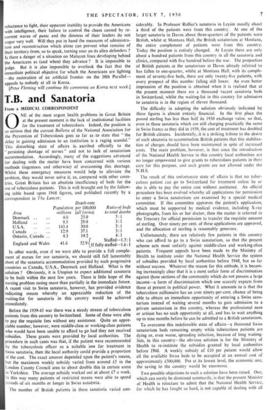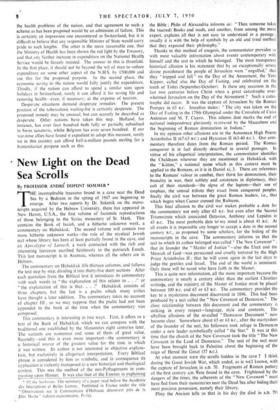T.B. and Sanatoria From - a MEDICAL CORRESPONDENT O NE of the
most urgent health problems in Great Britain at the present moment is the lack of institutional facilities for the treatment of tuberculosis. Indeed, the position is so serious that the current Bulletin of the National Association for
the Prevention of Tuberculosis goes so far as.to state that " the delay in gaining admission to an institution is a raging scandal" This disturbing state of affairs is ascribed officially to the " persisting shortage of nurses " and not to lack of sanatorium accommodation. Accordingly, many of the suggestions advanced for dealing with the matter have been concerned with various methods (ingenious and otherwise) of overcoming this shortage. Whilst these emergency measures would help to alleviate the problem, they would never solve it, as, compared with other coun- tries, Great Britain has an absolute insufficiency of beds for the use of tuberculous patients. This is well brought out by the follow- ing table based upon 1948 figures, and published recently by a correspondent in The Lancet: Death-rate
Population per 100,000 Ratio of beds
millions (all forms) to total deaths
4.0 25.0 5: I 9.5 28.0 . 3:1 143.4 30.0 3:1 12.9 37.1 3:1 4.3 19.2 4:1 England and Wales 41.6 529{ Staffed-1.6:1 If fully staffed-1.6: 1 In other words, even if we were able to provide a full comple- ment of nurses for our sanatoria, we should still fall lamentably short of the sanatoria accommodation provided by such progressive countries as Canada, U.S.A., Denmark and Holland. What is the solution ? Obviously, it is Utopian to expect additional sanatoria to be built within the next few years. There is little hope of the nursing problem easing more than partially in the immediate future. A recent visit to Swiss sanatoria, however, has provided evidence indicating means whereby an appreciable reduction of the waiting-list for sanatoria in this country would be achieved immediately.
Before the 1939-45 war there was a steady stream of tuberculous patients from this country to Switzerland. Some of these were able to pay the requisite fees without any assistance. Quite an appre- ciable number, however, were middle-class or working-class patients who would have been unable to afford to go had they not received subsidies. These grants were provided by local authorities. The procedure in such cases was that, if the patient were recommended by the tuberculosis officer as a suitable one for treatment in Swiss sanatoria, then the local authority could provide a proportion of the cost. The exact amount depended upon the patient's means, but the maximum weekly subsidy varied from around £5 in the London County Council area to about double this in certain areas in Yorkshire. The average subsidy worked out at about £7 a week. In this way many patients of restricted means were able to spend periods of six months or longer in Swiss sanatoria.
The number of British patients in these sanatoria varied con- Area Denmark ..
Holland .. U.S.A.
Canada .. Ontario, Canada siderably. In Professor Rollier's sanatoria in Leysin usually about a third of the patients were from this country. At one of the larger sanatoria in Davos about three-quarters of the patients were British, whilst at Montana Hall, the British sanatorium at Montana, the entire complement of patients were from this country. Today the position is entirely changed. At Leysin there are only about a hundred patients from this country in all the sanatoria and clinics, compared with five hundred before the war. The proportion of British patients at the sanatorium at Davos already referred to has fallen to one-quarter, whilst at Montana Hall, with its comple- ment of seventy-five beds, there are only twenty-five patients, with every prospect of this number falling still lower. An even better impression of the position is obtained when it is realised that at the present moment there are a thousand vacant sanatoria beds in Switzerland, whilst the waiting-list in this country for admission to sanatoria is in the region of eleven thousand.
The difficulty in adopting the solution obviously indicated by these figures is almost entirely financial. In the first place the pound sterling has less than half its 1930 exchange value, so that, even in those sanatoria which are still charging practically the same in Swiss francs as they did in 1939, the cost of treatment has doubled for British citizens. Incidentally, it is a striking tribute to the desire of such sanatoria to accommodate British patients that this stabilisa- tion of charges should have been maintained in spite of increased costs. The main problem, however, is that since the introduction of the National Health Service in this country local authorities are no longer empowered to give grants to tuberculous patients in their care for this purpose, and such grants are not allowed under the N.H.S.
The result of this unfortunate state of affairs is that no tuber- culous patient can go to Switzerland for treatment unless he or she is able to pay the entire cost without assistance. An official procedure has been evolved whereby all applications for permission to enter a Swiss sanatorium are examined by a special medical committee. If this committee approves the patient's application, which must be supported by medical evidence, including X-ray photographs, from his or her doctor, then the matter is referred to the Treasury for official permission to transfer the requisite amount of sterling. Over ninety per cent. of these applications are approved, and the allocation of sterling is reasonably generous.
Unfortunately, there are relatively few patients in this country who can afford to go to a Swiss sanatorium, so that the present scheme acts most unfairly against middle-class and working-class patients. Frequent appeals have been made to the Ministry of Health to institute under the National Health Service the system of subsidies provided by local authorities before 1948, but so far without success. Whatever the reason for this attitude, it is becom- ing increasingly clear that it is a most unfair form of discrimination against those sections of the community which do not possess a large income—a form of discrimination which one scarcely expects from those at present in political power. What it amounts to is that the tuberculous millionaire has an over ninety-per-cent. chance of being able to obtain an immediate opportunity of entering a Swiss sana- torium instead of waiting several months to gain admission to a private sanatorium in this country, whereas the professional man or artisan has no such opportunity at all, and has to wait anything up to nine months before he can be admitted to a British sanatorium.
To overcome this indefensible state of affairs—a thousand Swiss sanatorium beds remaining empty while tuberculous patients are dying or, even worse, spreading infection, because of long waiting- lists, in this country—the obvious solution is for the Ministry of Health to re-institute the subsidies granted by local authorities before 1948. A weekly subsidy of £10 per patient would allow all the available Swiss beds to be occupied at an annual cost of approximately £500,000. Put at its lowest level, the economic one, the saving to the country would be enormous.
Two possible objections to such a solution have been raised. One, which can surely be dismissed summarily, is that the present Minister of Health is reluctant to admit that the National Health Service, for which he has fought so hard, is not capable of dealing with all the health problems of the nation, and that agreement to such a scheme as has been proposed would be an admission of failure. This is certainly an impression one encountered in Switzerland, but it is difficult to believe that any responsible Minister of State would carry pride to such lengths. The other is the more reasonable one, that the Ministry of Health has been shown the red light by the Treasury, and that any further increase in expenditure on the National Health. Service would be fiercely resisted. The answer to this is threefold. In the first place, it should not be beyond the wit of man to reduce expenditure on some other aspect of the N.H.S. by £500,000 and use this for the proposed purpose. In the second place, the economic saving to the nation would fully justify the expenditure. Thirdly, if the nation can afford to spend a similar sum upon holidays in Switzerland, surely it can afford it for saving life and restoring health—even, if necessary, at the expense of tourists.
Desperate situations demand desperate remedies. The present position of the tuberculosis waiting-list is certainly desperate. The proposed remedy may be unusual, but can scarcely be described as desperate. Other nations have taken this step. Holland, for instance, has over four hundred beds fully or partially subsidised in Swiss sanatoria, whilst Belgium has over seven hundred. If our war-time allies have found it expedient to adopt this measure, surely we in this country can afford half-a-million pounds sterling for a humanitarian purpose such as this







































 Previous page
Previous page